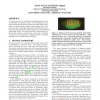Free Online Productivity Tools
i2Speak
i2Symbol
i2OCR
iTex2Img
iWeb2Print
iWeb2Shot
i2Type
iPdf2Split
iPdf2Merge
i2Bopomofo
i2Arabic
i2Style
i2Image
i2PDF
iLatex2Rtf
Sci2ools
ATAL
2008
Springer
2008
Springer
Automated global-to-local programming in 1-D spatial multi-agent systems
A spatial computer is a distributed multi-agent system that is embedded in a geometric space. A key challenge is engineering local agent interaction rules that enable spatial computers to robustly achieve global computational tasks. This paper develops a principled approach to global-to-local programming, for pattern formation problems in a one-dimensional multi-agent model. We present theoretical analysis that addresses the existence, construction, and resource tradeoffs of robust local rule solutions to global patterns, and which together form a "global-to-local compiler".
ATAL 2008 | Enable Spatial Computers | Global Computational Tasks | Intelligent Agents | One-dimensional Multi-agent Model |
| Added | 12 Oct 2010 |
| Updated | 12 Oct 2010 |
| Type | Conference |
| Year | 2008 |
| Where | ATAL |
| Authors | Daniel Yamins, Radhika Nagpal |
Comments (0)

